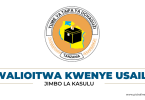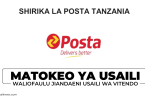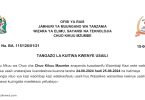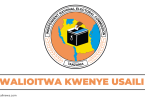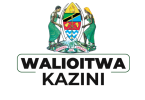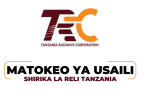Welcome to our website pickallnews.com, In This Article, are you looking for New How to Get Ready for an Utumishi Interview at Public Service Recruitment Secretariat (PSRS). An exciting chance to discover more about a company you’re interested in working for and explore a new career path is presented by a forthcoming interview. Whether you’re going to be doing a case interview or just an initial screening, it’s always necessary to prepare thoroughly.
Public Service Recruitment Secretariat (PSRS)
The Public Service Recruitment Secretariat (PSRS) is a government organ with a status of independent Department established specifically to facilitate the recruitment process of employees to the Public Service. PSRS was established by the Public Service Act No. 8 0f 2002 as amended by Act No. 18 of 2007, section 29(1).
By doing this, you’ll be able to project confidence in your skills, abilities, and appearance to the employer.
The methods to getting ready for your interview are outlined here. By following the instructions, you will investigate your capabilities first, then use the knowledge you gain to learn more about the business and convince a prospective employer of your value. Keep a look out for yours; we’ve also put together a list of articles that concentrate on interviewing for particular roles.
6 steps to prepare for an interview
Take out a journal or electronic file and schedule some time to apply these six introspective techniques New How to Get Ready for an Utumishi Interview:
1. Reflect on your professional strengths.
Creating detailed, targeted information about your qualifications for the job you’re applying for beyond what you could have stated on a CV or cover letter is the aim of this tactic. By using this strategy, you may focus on your strengths and speak about them more confidently throughout the interview.
First things first: compile your professional background, cover letter, and resume. Collect examples of prior work, academic assignments, and personal projects, if at all possible. Write a brief summary for anything you can’t access anymore.
With everything at your disposal, respond to these prompts with a piece of writing:
- What accomplishments and strengths do you see that you were unable to include in your cover letter and resume?
- Which professional skills have you acquired during your education and previous job?
- What talents from one job might you use to this one that you’re applying for?
- When you look back over your entire career, what fresh perspectives or ideas come to mind?
- In the clearest and most succinct words imaginable, how would you characterize these details?
2. Reflect on your personal strengths.
This approach aims to help you discover your true self and make the connection between that self and your professional potential. How can you be authentic in the job and what makes you who you are?
During your interview, you can project confidence and a high regard for yourself by thinking back on your personal strengths.
Write a reply to these questions:
- Which of your own achievements make you the happiest? For instance, you might have surmounted obstacles, improved your connections with others, developed a new skill, or imparted valuable life lessons to your kids.
- What moral principles do you bring to work? For instance, curiosity or clear communication.
- What brings you contentment and happiness? For instance, gaining new knowledge or encouraging people to follow their aspirations.
- What gives you a sense of competence and confidence? For instance, being able to put a new ability into practice several times, get helpful criticism, and make others feel at home.
- Who in your life has had the biggest impact on you? A parent, a mentor, a well-known artist, or an inventor are a few examples.
- Which of the lessons from prompts 1 through 5 could you use in a new role?
3. Research the company.
This plan aims to help you learn more about the organization, consider if working there will genuinely fulfill your professional and lifestyle objectives, and get ready to express your sincere excitement about the position.
Investigate the business’s website, social media accounts, and any content that is visible to the public first. What are the values and mission of the company? What goods and services is it providing? Who are its main rivals and target market?
Look through Indeed and Glassdoor company reviews to get an idea of how current and former workers feel about a company’s work-life balance, culture, possibilities for advancement, and sense of purpose.
Write a reply to these questions:
- After giving it more thought, what about the business do you find admirable?
- What specifically piques your interest in relation to the job you’re looking for?
- What answers are you looking for?
- What kind of ideas, emotions, and pictures spring to mind when you picture yourself employed by this company?
- What kind of culture can you expect at work?
- Is it possible for you to feel at ease, appreciated, and supported by the team?
- Based on these concepts, how would you like to show your interest in this company?
4. Research your interviewer.
This tactic aims to lay the groundwork for building a connection with your interviewer in the actual interview.
- Verify that you are familiar with the name and position of the person—or people—you will be interviewing.
- Look up the employee’s public professional profile on LinkedIn and the corporate website to learn about their function in the organization, length of employment, and potential relationship if you were hired.
- Look over their profile to see what information interests you or that you both find similar. For instance: Do the two of you have past experience in the same field? What aspects of the interviewer’s career achievements do you find admirable?
Here are a few instances of how you could bring up your findings in order to establish rapport with the interviewer:
“I noticed that you had worked here for five years after reading your corporate profile. What have you most liked doing?
“I saw from looking at your LinkedIn profile that you wrote a piece about the most recent trends in our field. It was quite informative, in my opinion.
It’s important to exercise caution when gathering information on your interviewer during your study. While some interviewers might value your extensive study and genuine curiosity about their work experience, others could find it awkward to share personal details with a prospective hire they’re vetting.
5. Find talking points in the job description.
Reexamining the job description and coming up with new strategies to position yourself as a good applicant are the objectives of this strategy.
Write an answer to the following queries:
- What first motivated you to submit an application for the job?
- Which of the necessary technical abilities are you confident you possess, and which would you like to get further training in?
- How can you relate specifics from your cover letter, CV, and the knowledge you’ve gained from this article’s tactics to the job description?
- Depending on the sort of interview, how can you effectively explain these linkages during the process?
6. Explore answers to common interview questions.
This tactic aims to set up the mental and emotional framework for responding to the interviewer’s queries. Here, you will apply everything you have read and thought about thus far to write succinct, persuasive responses to possible queries. Furthermore, this practice can assist you in immediately recalling specifics and preventing blanks during certain situations.
Write down potential responses to frequently asked interview questions, like “Why should we hire you?” as a warm-up. or “What inspires you?”
Next, go deeper by looking up typical interview questions related to your industry, particularly the position you’re applying for. Take a cue from these examples tailored to various careers:
- During a data analyst interview, you can be asked, “What steps do you take to solve a business problem?” or “How do you go about starting a new project?”
- “How is UX design different from visual design?” can be a question you hear during a job interview for a UX designer. or “How do you go about designing?”
- “What is your experience with budget management?” can be a question posed to you during a project manager interview. or “What project planning tools do you use?”
Read also: Coca-Cola Kwanza Ltd Hiring Syrup Maker CCB240412-1
PSRS Interview:
The Public Service Recruitment Secretariat Secretary notify job applicants who selected for an interview each month at PSRS Recruitment portal at https://www.ajira.go.tz/ and not on another way.

